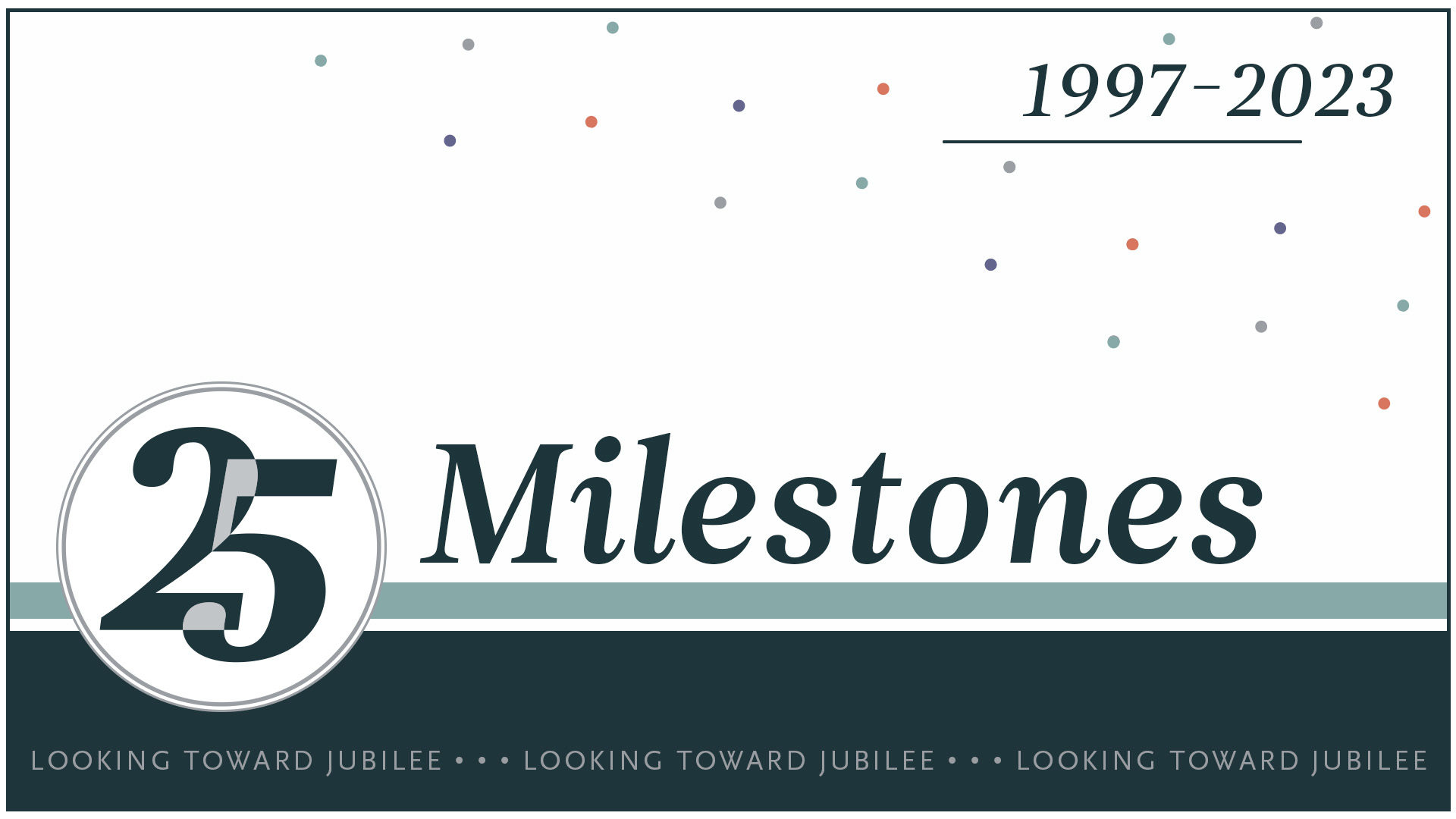The timeline doesn’t start with us, it began with people named Hudson, Webb, Wilson, Hutchins, Atchison, Allender, Lynk, and Grenz. And Peter, Paul, Priscilla, Lydia, and Mary.
– Keith Anderson, President Emeritus, Convocation 2015
At The Seattle School, we celebrate story and honor narrative. And as we mark and celebrate our 25 years, we are looking back from where we’ve come and we are looking ahead to where we imagine we will go. The narrative below explores some of the milestones and stories since 1997. As a companion piece, take a look at a visual representation of 25 milestones from these 25 years.
How the Story Started: Kitchen Tables and Living Rooms
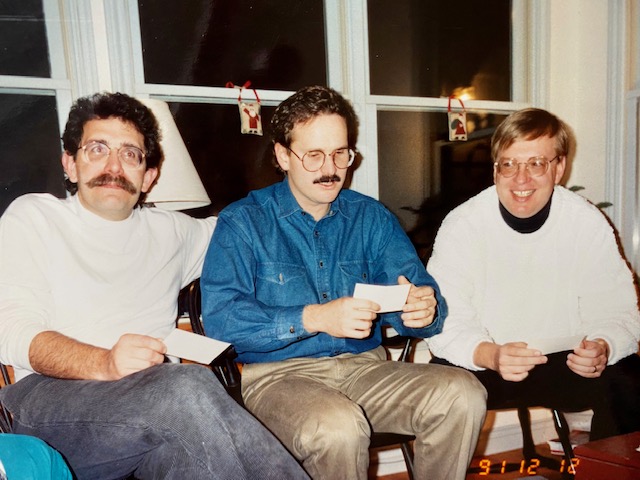 The story of The Seattle School that has become lore, the story as it is told, started with a few dreamers gathered around a kitchen table envisioning new training and education at the intersection of theology, psychology, and culture. Around this almost-mythical kitchen table, these passionate founders imagined and asked questions together. They wanted to expand the table, to invite more voices into the circle of conversations and discourse, always looking from these kitchen table conversations and these living room dreams into an innovative and interdisciplinary community of faith, always looking into the future. “The Seattle School was started. . .in the living rooms, kitchens, classrooms, and offices of people whose vision was pointed to the future,” said President Keith Anderson. More than twenty-five years ago, these dreamers sought to create a diverse and inclusive community of healers and change-makers, a community of people serving God and neighbor through transforming relationships. Bringing hope and light into places of darkness and trauma, this community would gather around the pursuit of three understandings and narratives: the Bible, the human soul, and contemporary culture. And so with these convictions and passions, the dreamers and their families soon found themselves in Seattle beginning a bold adventure.
The story of The Seattle School that has become lore, the story as it is told, started with a few dreamers gathered around a kitchen table envisioning new training and education at the intersection of theology, psychology, and culture. Around this almost-mythical kitchen table, these passionate founders imagined and asked questions together. They wanted to expand the table, to invite more voices into the circle of conversations and discourse, always looking from these kitchen table conversations and these living room dreams into an innovative and interdisciplinary community of faith, always looking into the future. “The Seattle School was started. . .in the living rooms, kitchens, classrooms, and offices of people whose vision was pointed to the future,” said President Keith Anderson. More than twenty-five years ago, these dreamers sought to create a diverse and inclusive community of healers and change-makers, a community of people serving God and neighbor through transforming relationships. Bringing hope and light into places of darkness and trauma, this community would gather around the pursuit of three understandings and narratives: the Bible, the human soul, and contemporary culture. And so with these convictions and passions, the dreamers and their families soon found themselves in Seattle beginning a bold adventure.
Humble Beginnings in Bothell: 1997 – 2007
What we know today as The Seattle School of Theology & Psychology offered its first classes under the auspices of Western Seminary in 1997, finding a location at first in the suburb of Bothell, Washington. That fall the first classes of Western Seminary, Seattle as it was then called, were held in a variety of spaces, including a church nursery, students and faculty gathering around children’s tables in children’s chairs, eager to learn from each other, many of whom had moved to Seattle for this dream. The list of founders includes Dan Allender, Liam Atchison, Don Hudson, Kim Hutchins, Christie Lynk, Heather Webb, and Kirk Webb. The first class graduated in 1999. After an incubation period, the school launched in 2002 as an independent institution named Mars Hill Graduate School (MHGS), with Dan Allender becoming the first President. At that time, three degree programs were offered: Master of Arts in Counseling (MAC), Master of Spiritual Nurture (MSN), and Master of Divinity (MDiv).
Shaping and Marking Culture: Creating Rituals and Gatherings 2002 – 2007
In those early years, the community of students, faculty, and staff shaped the school’s culture, creating invitations for gathering together, beginning traditions and rituals that have continued into the present time: Spring Banquet, student groups, Convocation, and Commencement. The tradition of offering Hot Tamales candies at the front desk began at this time, as a playful reference to the 1999 film “The Matrix” where a red pill symbolized a character’s courageous choice to understand the truth about reality. The first time Convocation took place at St. Mark’s was in 2004. A few years after becoming MHGS, additional space was rented in Bothell for a prayer chapel. Soon the community rhythm of the nine noon three chimes began, reminding us, disrupting us, and calling us together. Our library grew extensively thanks to our staff and a grant from the M.J. Murdock Charitable Trust. Each year the school hosts theological leaders and thinkers for a lecture series in memory of Stanley Grenz, a passionate professor with a pastoral heart and deep intellectual presence, who passed away in 2005.
New Location, New President, New Name: 2006 – 2011
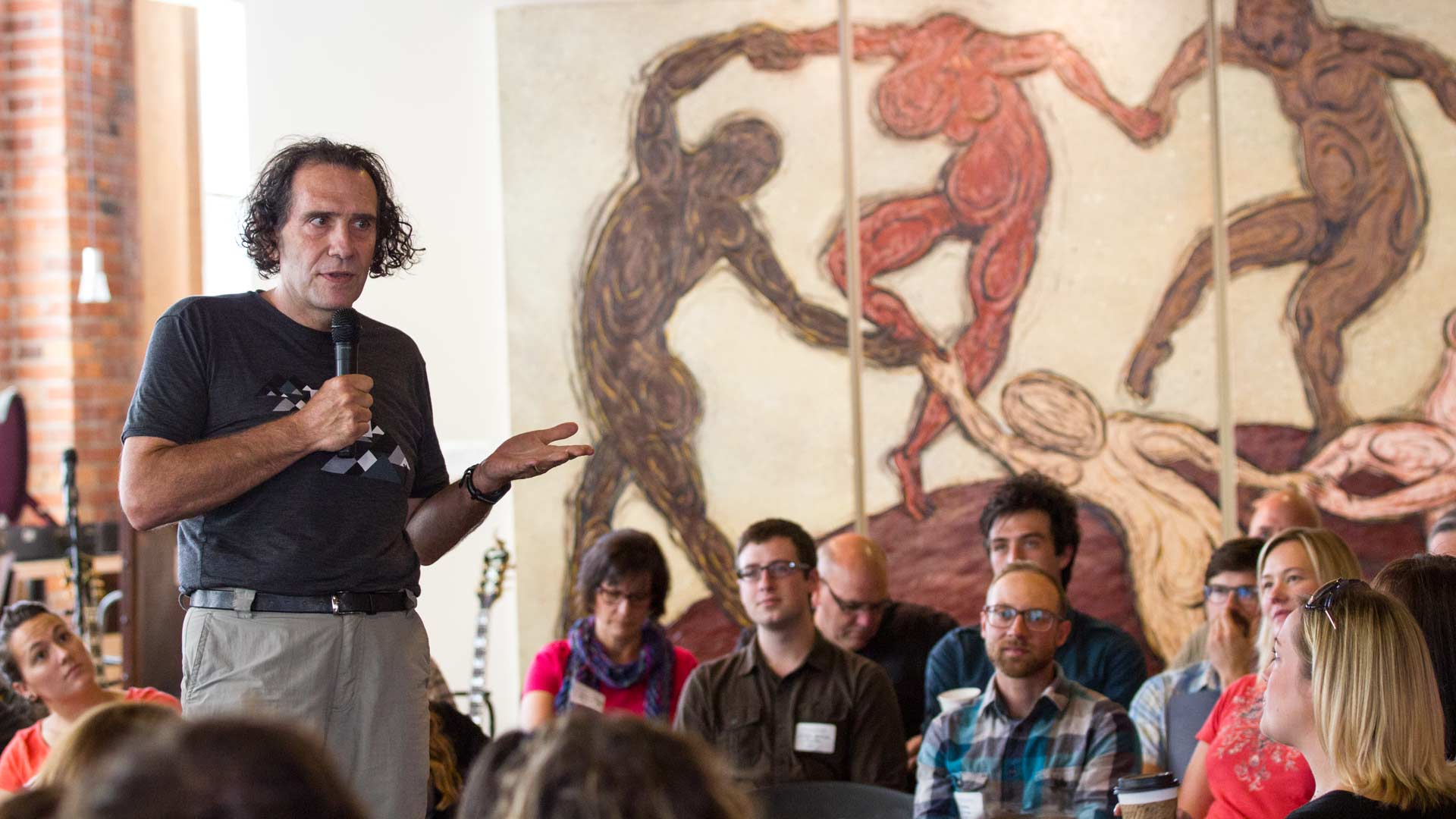 In January 2007, classes began at the new home of The Seattle School, a campus now known as “the red brick building” in Belltown, an area of the city along the Salish Sea just north of the downtown corridor, a building that was a former luggage factory and fish cannery, on land where the Duwamish people had once lived. In 2002, student leadership selected Henri Matisse’s La Danse painting as a symbol of who the Spirit was calling us to become. In the Commons of the Belltown campus, a reimagined version of this painting, “La Danse Revisited”, reminds us of our desire to be “a diverse community struggling to learn, labor, love, and serve together” and the beauty and brokenness as we dance with God and each other and the world. Our scholarship deepened through the work and expansion of our faculty, through the continued development and evolution of our degree programs including the enhancement of the MDiv program through an additional Murdock grant, and through the 2007 acquisition of The Other Journal which had been founded independently in 2003 by alumni.
In January 2007, classes began at the new home of The Seattle School, a campus now known as “the red brick building” in Belltown, an area of the city along the Salish Sea just north of the downtown corridor, a building that was a former luggage factory and fish cannery, on land where the Duwamish people had once lived. In 2002, student leadership selected Henri Matisse’s La Danse painting as a symbol of who the Spirit was calling us to become. In the Commons of the Belltown campus, a reimagined version of this painting, “La Danse Revisited”, reminds us of our desire to be “a diverse community struggling to learn, labor, love, and serve together” and the beauty and brokenness as we dance with God and each other and the world. Our scholarship deepened through the work and expansion of our faculty, through the continued development and evolution of our degree programs including the enhancement of the MDiv program through an additional Murdock grant, and through the 2007 acquisition of The Other Journal which had been founded independently in 2003 by alumni.
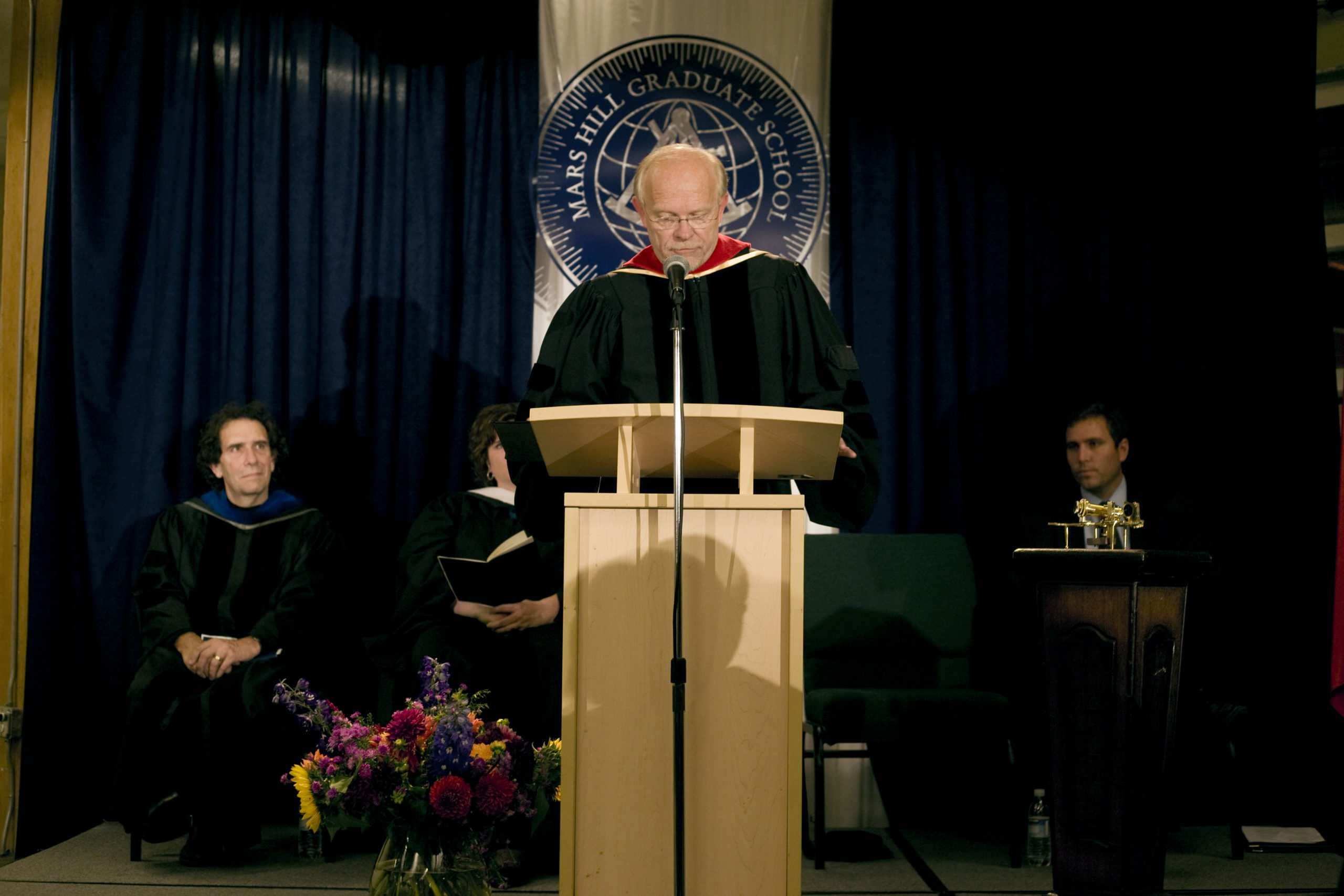 In 2009, Keith Anderson, who had joined the school as a dean and faculty member a few years earlier, stepped into the role of President. At his inauguration, the sextant became the official symbol of the presidency, “a symbol of leadership that looks ahead, to read that which is to come and to see what helps to guide the ship to its destination”. After much discourse, the Board of Trustees voted to change the name of Mars Hill Graduate School to The Seattle School of Theology & Psychology in 2011. This name change continued the work of weaving our mission and identity with context and culture in the city, locating our story and ministry in time and place, while also establishing ourselves as leaders at the intersection of theological and psychological thought. The “&” would officially be incorporated into our name in 2014 although the symbol was immediately adopted internally, emphasizing our culture of inclusion and interdisciplinary thought.
In 2009, Keith Anderson, who had joined the school as a dean and faculty member a few years earlier, stepped into the role of President. At his inauguration, the sextant became the official symbol of the presidency, “a symbol of leadership that looks ahead, to read that which is to come and to see what helps to guide the ship to its destination”. After much discourse, the Board of Trustees voted to change the name of Mars Hill Graduate School to The Seattle School of Theology & Psychology in 2011. This name change continued the work of weaving our mission and identity with context and culture in the city, locating our story and ministry in time and place, while also establishing ourselves as leaders at the intersection of theological and psychological thought. The “&” would officially be incorporated into our name in 2014 although the symbol was immediately adopted internally, emphasizing our culture of inclusion and interdisciplinary thought.
New Centers & New Opportunities: Extending the Table 2011 – 2021
In 2011, The Seattle School founded the Allender Center to steward the legacy of Dan Allender and the narrative-focused work of healing for individuals, families, and communities, equipping people to engage their own stories so that they can bring healing to others. More than ten years later, Allender Center remains committed to training people to work through narratives of harm to find beauty and goodness in relationships, creating a wide range of resources so that healing can be accessible and holistic.
Keeping the dream and the mission ever in mind, the school continued to develop coursework and degree programs relevant to context and culture. The Master of Spiritual Nurture degree program became the Master in Christian Studies, and then in 2013, the school created the Master of Arts in Theology & Culture (MATC), offering a formational education at the intersection of theology, psychology, and culture. Around this same time, scholarships also expanded, with staff and alumni creating new resources and adding to a pool of scholarships that had existed from the Western Seminary days.
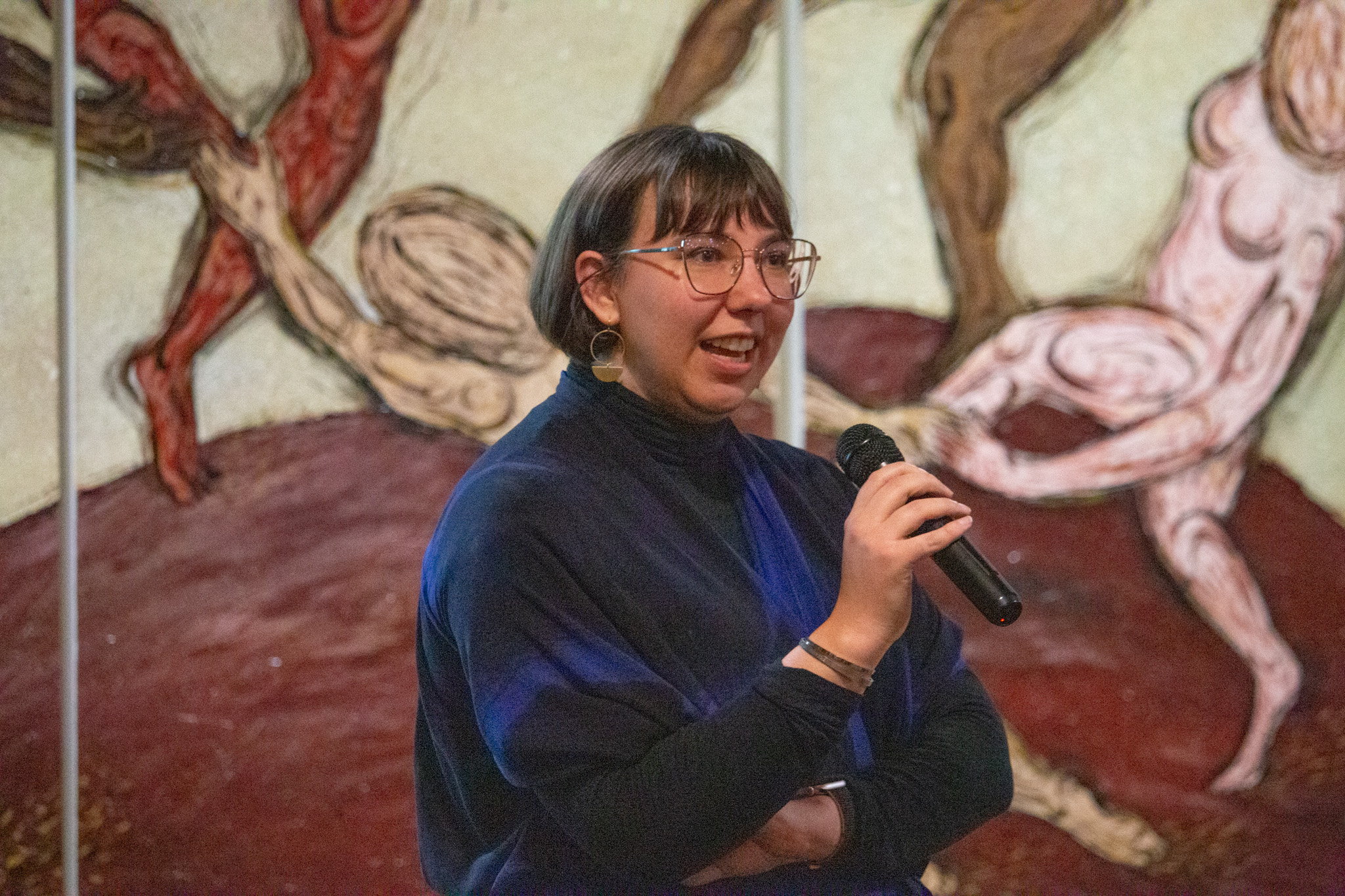 The Resilient Leaders Project team began in 2017 and has impacted hundreds of ministry leaders as it has developed. Supported by grant funding, the team’s research and work with leaders’ resilience and team formation grew into the foundation of Center for Transforming Engagement, launched in 2021 to equip adaptive leaders with tools from the social sciences to lead communities of faith, hope, and love.
The Resilient Leaders Project team began in 2017 and has impacted hundreds of ministry leaders as it has developed. Supported by grant funding, the team’s research and work with leaders’ resilience and team formation grew into the foundation of Center for Transforming Engagement, launched in 2021 to equip adaptive leaders with tools from the social sciences to lead communities of faith, hope, and love.
In 2019, Fuller Theological Seminary gifted the journal Christ & Cascadia which then became the second publication housed at The Seattle School. With its integrated focus on context and culture, Christ & Cascadia publishes articles exploring the innovative, imaginative, and redemptive work of communities and leaders of faith in the bioregion from the Pacific Ocean to the Continental Divide, from northern California through southern Alaska.
This time of growth and expansion was also a time of leadership transitions, beginning in 2017 when Keith Anderson said goodbye, becoming President Emeritus. Craig Detweiler served as President from January 2018 to February 2019. Derek McNeil stepped into interim leadership and was voted in by the Board of Trustees becoming President in October 2019.
Accreditation & Expansion 2003 –
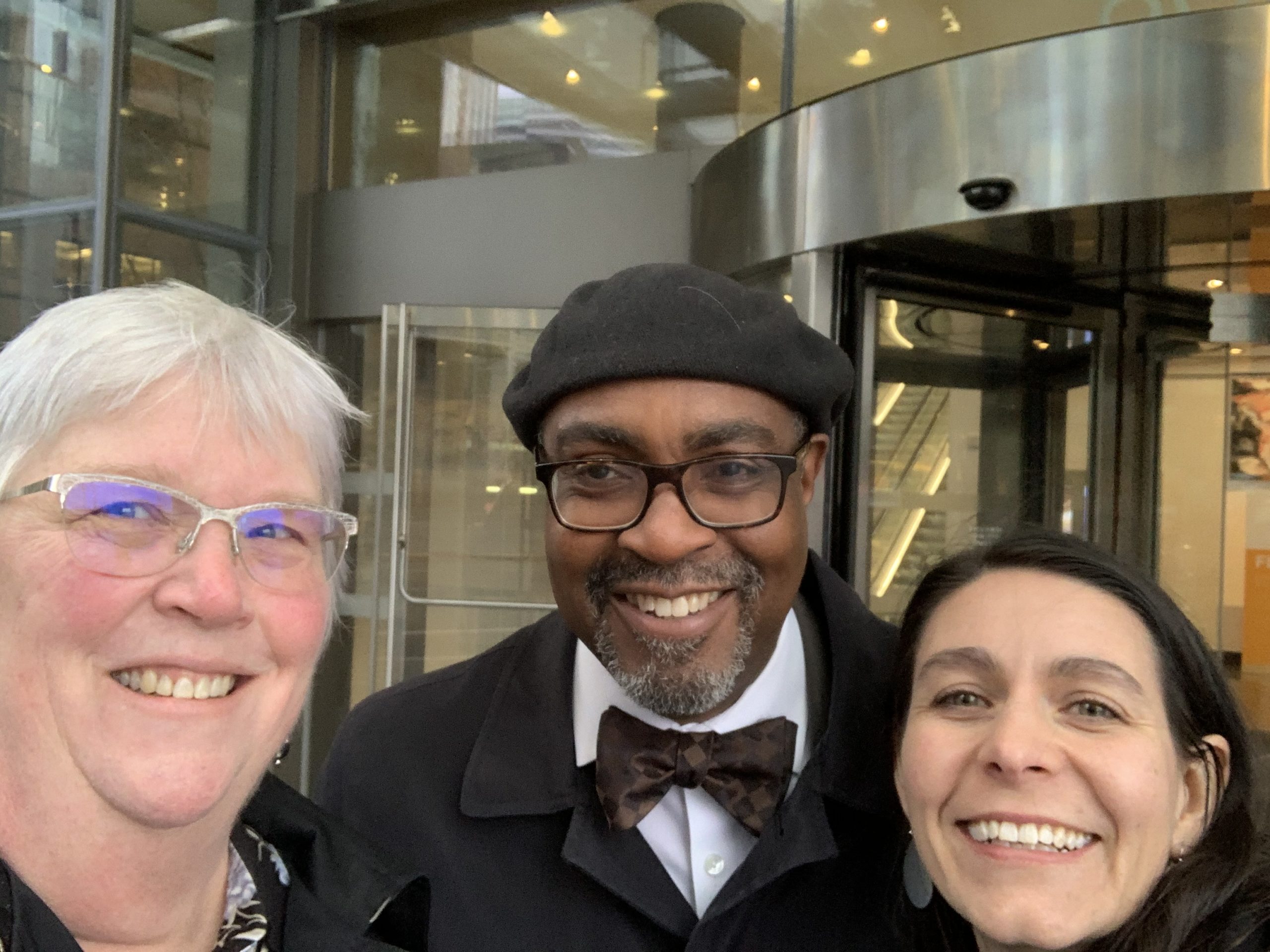 The school first received accreditation from Transnational Association of Christian Colleges and Schools (TRACS) in 2003. In 2013, the Association of Theological Schools (ATS) Commission of Accrediting voted to grant The Seattle School of Theology & Psychology full accreditation for seven years, the longest period allowed for initial accreditation. Reaffirmation of accreditation for 10 years was granted in 2021. In February 2020, the Northwest Commission on Colleges and Universities (NWCCU) granted The Seattle School accreditation [image: The Seattle School team including President J. Derek McNeil after hearing that the school would receive regional accreditation with NWCCU]. Months later in October 2020, NWCCU officially approved The Seattle School to offer distance education. In June 2021 ATS approved The Seattle School to offer comprehensive distance education. As an institution looking into the future, leadership had already been considering offering distance education, and the Covid-19 pandemic lockdown situation beginning in spring 2020 provided the opportunity for developing pedagogy and tools for a new and accessible modality.
The school first received accreditation from Transnational Association of Christian Colleges and Schools (TRACS) in 2003. In 2013, the Association of Theological Schools (ATS) Commission of Accrediting voted to grant The Seattle School of Theology & Psychology full accreditation for seven years, the longest period allowed for initial accreditation. Reaffirmation of accreditation for 10 years was granted in 2021. In February 2020, the Northwest Commission on Colleges and Universities (NWCCU) granted The Seattle School accreditation [image: The Seattle School team including President J. Derek McNeil after hearing that the school would receive regional accreditation with NWCCU]. Months later in October 2020, NWCCU officially approved The Seattle School to offer distance education. In June 2021 ATS approved The Seattle School to offer comprehensive distance education. As an institution looking into the future, leadership had already been considering offering distance education, and the Covid-19 pandemic lockdown situation beginning in spring 2020 provided the opportunity for developing pedagogy and tools for a new and accessible modality.
Looking to the Future: 2021 –
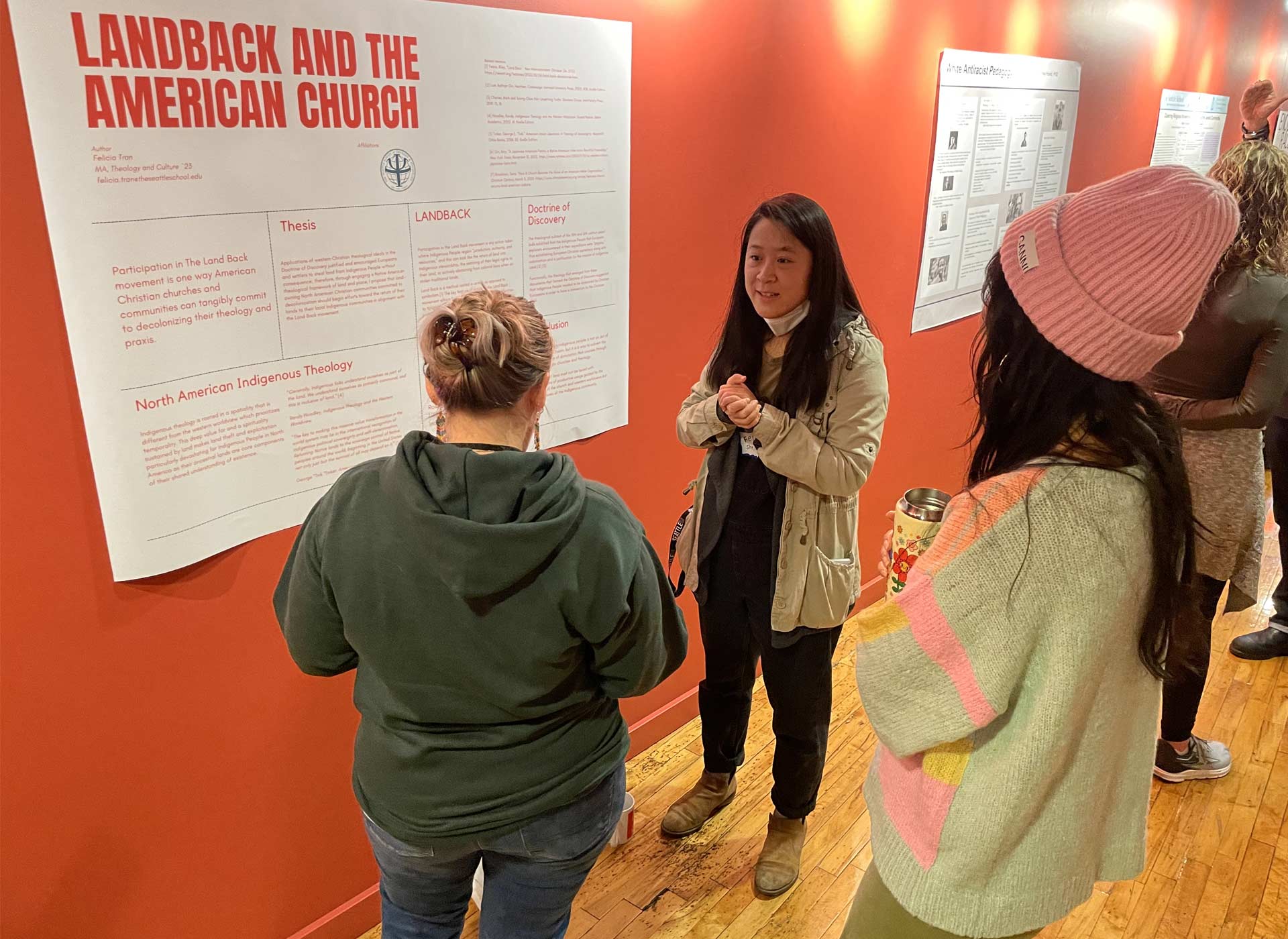 In September 2021, The Seattle School officially launched the first low-residency cohorts. All MATC students and a number of MACP students (the Master of Arts in Counseling became a Master of Arts in Counseling Psychology degree in 2005) engage with faculty and colleagues through online coursework, traveling to campus a few times each year to participate in residencies. This expansion into distance education is allowing The Seattle School to flourish into the future, as our innovative programs become more accessible to students across the country and around the world. We plan to continue to expand online offerings for degree and non-degree learners at the intersection of theology and psychology.
In September 2021, The Seattle School officially launched the first low-residency cohorts. All MATC students and a number of MACP students (the Master of Arts in Counseling became a Master of Arts in Counseling Psychology degree in 2005) engage with faculty and colleagues through online coursework, traveling to campus a few times each year to participate in residencies. This expansion into distance education is allowing The Seattle School to flourish into the future, as our innovative programs become more accessible to students across the country and around the world. We plan to continue to expand online offerings for degree and non-degree learners at the intersection of theology and psychology.
Looking to the future, in 2022, The Seattle School created three Master of Arts in Theology & Culture degrees: MATC: Community Development, MATC: The Arts, and MATC: Ministry. The MDiv program was sunsetted. In this same year, Esther Meek became our inaugural Senior Scholar, emphasizing our focus on theological scholarship.
Twenty-five years after the founders gathered in living rooms and kitchens, now students, faculty, and staff continue in conversations, sometimes at the campus in Seattle, and sometimes from kitchen tables, living rooms, and home offices, crossing distant regions and countries through 2023 technology. Twenty-five years later, we continue in faith and in hopeful imagination. We continue in “La Danse”: asking questions, in dialogue and discourse, expanding the table and inviting more voices. Looking toward Jubilee, we imagine how we will continue to expand our community of healers and practitioners, therapists, pastors, leaders, and artists bringing hope and healing through scholarship and practice throughout our communities and into the world.
Join the celebration! Share your story and learn more about our 25 Year anniversary. See the visual representation of these milestones in a timeline.


